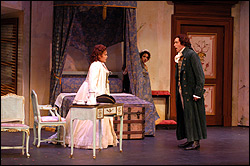Every Western Civ 101 textbook will tell you that the defining moment in Mozart’s opera The Marriage of Figaro (through Sunday, April 10, at Meydenbauer Center; 206-389-7676) is Figaro’s Act I aria “Se vuol ballare.” Figaro has just realized that his employer, the Count, has amorous designs on his fiancée, Susanna, and Figaro vows to thwart him: “If you wish to dance, Count,” he sings, “I’ll play the tune!” In its unprecedented depiction of a servant challenging a nobleman, this scene is one of the very few instances in which the late 18th-century’s decorative, formally structured music and revolutionary political philosophies crossed paths—leading to plenty of Figaro productions that overemphasize politics, fetishize relevance, and do everything but spell out “CLASS STRUGGLE” onstage in 20-foot-high neon letters.
Thankfully, director Peter Kazaras and the cast of Seattle Opera’s Young Artists Program know that every Western Civ 101 textbook is wrong. The defining moment in their current production of Figaro, as it should be in this most humane and affectionate of operatic comedies, launches the happy ending: the Countess’ noble forgiveness of her philandering, jealous, hypocritical husband. That’s a lot of responsibility for the soprano in the role. Much more than the title character, the Countess sets the tone for Figaro; she brings an emotional underpinning to the plot’s farcical complexities, and whether the scene of forgiveness is a transcendent climax or a mechanical plot resolution depends on the depth and nuance of the singer’s portrayal up to that point.
The role’s delicious bittersweetness makes it popular among maturing divas, but the Countess is still a young woman (she’s Rosina, the ingenue of Figaro‘s prequel The Barber of Seville, revisited just a few years later). Edlyn de Oliveira, the opening night Countess of this double-cast production, plays her so—a bit of a spitfire, effectively setting off sparks with Michael Todd Simpson’s Count. Mozart puts the Countess in the solo spotlight twice, with two nerve-rackingly difficult lyrical arias. Understandably, de Oliveira sounds more at ease in the second and, fortunately, still more at ease (toning down her ample vibrato) at the denouement, when it really counts. Simpson kneels contrite before her; de Oliveira sinks down to take his hands, her off-white gown billowing around her as if she were descending on a cloud, and delivers her two brief lines of pardon simply and movingly.
Maria D’Amato and Sarah Heltzel are perfectly polished and vivacious as Susanna and the page Cherubino, but the men, though vocally just as impressive, are still a little restrained, not yet inhabiting their characters fully and comfortably. The roles all offer room for expansion: in seductive charm for the Count, in earthiness and vigor for Figaro (a bold-voiced Joseph Rawley), and in languid slyness for the intriguer Basilio (guest artist Ted Schmitz, in an imaginatively epicene take on the character). Several other guest singers have great fun with their smaller parts: Ellen McLain, David Crawford, Jessica Robins Milanese, and especially Archie Drake, at 80 (!) a Seattle Opera veteran since 1968.







